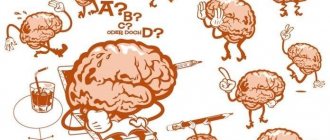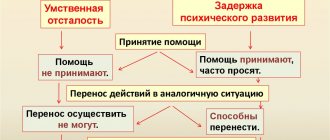Article:
The preschool period is a significant stage of life. What are the main features of preschool psychology? At this stage, social boundaries expand significantly (from the family to the street, the first children's group, the whole city, and even the country). The child studies the world of people’s relationships, their various types of activities, social roles, and strives to participate in them to the best of their ability. But at the same time he also wants to be independent. This contradiction (to participate in social life and to show independence) is expressed in role-playing games. On the one hand, this is an independent activity, on the other hand, it models adult life.
LEADING ACTIVITY – GAME
So, play plays a major role in the mental development of preschool children. Going through certain age stages, it transforms depending on the degree of development of the baby:
- 3 – 4 years – director’s play;
- 4 – 5 years – the game becomes figurative and role-playing;
- 5 – 6 years – the game takes on a role-playing orientation;
- 6 - 7 years old - preschoolers play according to the rules established for each game.
Each game, to one degree or another, reflects some area of activity, as well as relationships. The game gradually ceases to be manipulative - using only objects. Its essence is transferred to a person, to his activities. Therefore, the child perceives the actions of adults as not only an objective, but also a subjective example.
The game has enormous developmental and educational significance. During games, children learn to fully communicate with each other: share, negotiate, help, conflict. The game develops motivation and the needs of children. In role-playing games with complex plots and actions, preschoolers actively develop their creative imagination. The game helps the child improve voluntary memory, perception, thinking, and intellectual activity. All this contributes to its further development and becomes the basis for preparation for training.
Elements of a child's readiness for school
An important place in the period of preschool childhood is given to the formation of the child’s readiness for a fundamentally new stage in his life - entering school. The phenomenon of school readiness includes several basic components.
Aspects of school readiness
Let's briefly describe them:
- Intellectual readiness is the child’s mastery of the necessary system of school knowledge, skills, and abilities that are significant for learning. The ability to navigate the surrounding world and the sphere of everyday knowledge at the proper level.
- Motivational readiness – understanding the meaning and purpose of school learning. The presence of the proper level of development of cognitive motivation in children.
- Social readiness – understanding the student’s status. Awareness of exactly what changes will affect the child’s life after entering school, what features the student’s life has.
- Physical readiness is the child’s possession of the proper level of physical development and endurance, which make it possible to be in class unhindered for the allotted time.
When assessing the mental development and readiness for school of a child in preschool age, it is necessary to take into account all the above-described features.
Playing chess helps develop logic
Although most of the components of school readiness are often overlooked, they are extremely important. A comprehensive assessment carried out by parents, as well as professional teachers, makes it possible to classify the child into the group of children:
- ready for school;
- still at the level of gaming activity.
The final stage of the preschool period is the crisis of the age of 6-7 years.
Resolving conflicts associated with the transition, a rather abrupt transition from the usual play activities to educational ones, will be the main problem of the mental development of children of senior preschool age. leave a comment
MENTAL FUNCTIONS IN PRESCHOOL AGE
These include perception, speech, memory, thinking. The mental processes of preschoolers go through a long process of improvement.
- Speech development.
By school age, most children have completed the formation of speech and mastery of its capabilities. Speech helps a child communicate with others and think. Language becomes a subject of study - preschoolers learn to write and read. The vocabulary is growing rapidly. If a one and a half year old baby can use up to 100 words, then by the age of 6 there are already about 3000 of them. Grammatical command of speech also develops. The child creatively masters the capabilities of his native language. He masters various forms of contextual and oral speech: learns retelling, monologue, story. Dialogue speech also becomes brighter and more expressive. It contains assessments, instructions, and moments of coordination of actions. Speech helps a preschooler plan his actions and regulate them.
- Development of perception.
The main feature of perception is that it gradually loses its original emotionality: perception and emotions are separated from each other. By the beginning of school age, perception becomes more and more meaningful; it becomes purposeful, arbitrary, and analytical.
- Development of thinking.
Perception is closely related to the child’s thinking. So much so that in preschool psychology it is customary to single out visual-figurative thinking as the most characteristic of the age. However, there is a systematic transition towards it from visual-effective thinking, when the child needs to rely on manipulations with objects when drawing conclusions. The final stage will be the transition to verbal thinking. This is why it is so important to pay attention to the speech development of a preschooler. At this stage, the baby learns to generalize, search and establish connections between processes, objects, and actions. This is important for the proper development of intelligence in the future. True, generalization can still be made with errors - children, without sufficient experience, often focus only on external signs (for example, a large object cannot be light).
- Memory development.
Memory in preschool age is the main function; it contributes to the formation of personality. Neither before nor after the preschool period can a child memorize so much diverse information so quickly and easily. The memory of preschoolers has its own specifics. Thus, in early preschool age, a child’s memory is involuntary. He remembers only what interested him and aroused emotions. By the age of 4–5 years, voluntary memory begins to develop. True, conscious memorization appears only occasionally. Voluntariness will finally be formed by the senior preschool age. The first childhood memories are usually preserved from the age of 3–4 years.
Development of communication skills in children
An important characteristic of communication in preschool age is that the child already sufficiently masters speech. With the help of speech, it becomes much easier to convey to him information about the rules and norms of behavior, possible rewards and punishments. Thus, one of the most important functions of communication is realized - cognitive. Verbal means also allow you to receive more effective feedback, giving the child the opportunity to notify an adult about his mood, condition and well-being at the current moment.
Communication skills develop from infancy
In addition, the period of preschool childhood is the time when the child begins to communicate not only with adults, but also with his peers. And then they become more selective, trying to interact only with those who, for one reason or another, seem more pleasant to him.
If you look at groups of preschoolers engaged in one activity or another - for example, creativity or play, it is easy to notice that already during this period they have a clear distribution of roles. Leaders, their immediate circle, as well as less sociable and even rejected children are singled out.
Communication with peers is built in preschool age in several stages. At first, the child is actively involved in active activities, adopting forms of behavior from his environment, independently offering him certain scenarios, or directing the activities of younger ones.
Motives of behavior in children
After this, the child begins to separate himself from others and perceive himself independently of other children. He tries to demonstrate to other children his personal qualities, abilities and talents. In the process of joint activity, the child’s character and personal qualities begin to emerge. He is already showing what he does not like and what he is dissatisfied with. Feedback plays an important role: when communicating with children and sharing any information with them, he already pays attention to their reaction and perception of himself.
FORMATION OF PERSONALITY
One of the important aspects in the psychology of preschool age is the process of development of a small personality: its emotions, motivation, self-awareness.
- Emotional sphere.
The period of preschool childhood is relatively stable and calm emotionally: there are practically no special outbursts or conflicts, with the exception of the crisis of 3 years, when the child just realizes himself as a small social person. The stable development of the emotional sphere is facilitated by the development of the child’s ideas. Representations allow him to switch from a specific situation, so the difficulties that arise do not seem so significant. However, the experiences themselves gradually become more complex, deeper, more diverse, and the range of experienced emotions increases. For example, empathy for others appears. The child learns to feel and understand not only his own self. All images in the child’s mind acquire an emotional coloring, all his activities (and this, first of all, play) are saturated with vivid emotions.
- Motivation.
The beginning of personality formation is associated with the formation of such an important personal mechanism as the subordination of motives. They have different significance for a preschooler. One can distinguish motives of self-esteem (competition, achieving success), motives associated with the formation of moral standards, etc. In the preschool years, the child’s individual motivational system begins to build, which will be of great importance for his future success.
- Self-awareness.
It is considered to be the main new formation of the period. The formation of self-awareness is facilitated by active personal and intellectual development. Self-esteem is formed in middle preschool age, initially from one’s own assessment (necessarily positive), and then from assessments of the behavior of others. What is typical: the baby learns to evaluate the actions, skills or behavior of other children first, and then his own.
At this stage, gender identification occurs. Children recognize themselves as representatives of the male or female gender - a girl or a boy, and learn the features of appearance, clothing, character, behavior, and social roles of different sexes. By the senior preschool period, the child begins to perceive himself in time: he remembers what he was like in the past, is aware of himself “here and now,” and can also imagine what he will be like in the future. The baby knows how to correctly express these ideas in speech.
Infancy (from birth to one year)
During the first month of life, newborns automatically respond to external stimuli. In other words, the newborn will turn his head toward his mother's hand when she strokes his cheek, or grab a finger if it is placed in her hand.
The newborn sees objects close up, recognizes certain smells, smiles or cries to indicate need, and moves his head from side to side. Newborns may have developmental disorders such as spina bifida or genetic disorders.
Babies quickly develop new abilities in the first year of life. From three to six months, the baby controls head movements and brings his arms together. By six to nine months, the child sits without support, babbles and responds to his name. Between the ages of nine and twelve months, the baby grasps objects, crawls, and even stands with support.
Slow development in infants is a sign of Down syndrome or other disorders. The doctor’s tasks include early detection of developmental disorders in children.
WHAT INFLUENCES THE DEVELOPMENT OF A PRESCHOOL CHILDREN'S PSYCHE?
Undoubtedly, the development of such a complex structure as the psyche is influenced by many different factors. These include, first of all, biological and social factors.
- Biological factors are heredity, features of the course of pregnancy and intrauterine development of the baby (the presence of diseases, infections, etc.), features of childbirth (complicated, rapid, cesarean section), the degree of full term of the child at the time of birth, and, accordingly, the degree of biological maturation of all of his systems and organs.
- Social factors include, first of all, environmental factors: natural and social. The natural environment affects the development of a child only indirectly. Climatic and geographical conditions determine certain types of work activity, as well as culture. This leaves an imprint on the characteristics of training and education. The social environment is the direct influence of society. It has a significant impact on the child’s mental development on two levels. These are macro and micro environments.
- Macroenvironment is society in a broad sense. That is, society with its cultural traditions, level of development of culture, art, religion, ideology, media... The child is included in various forms of activity, cognition and communication in accordance with accepted human culture and social experience. The program of mental development is formed by society and embodied through the system of training and education in surrounding social institutions.
- The microenvironment is the child’s immediate environment (his parents, family, neighbors, friends, teachers). The microenvironment has a significant influence on the early stages of a child’s mental development. It is family upbringing that plays the most important role in the development of a small personality. It determines many important aspects: features of communication and activity, self-esteem, creative and intellectual potential. Outside the social environment, no child can develop fully.
Try to create a favorable psychological microclimate in the family. This will contribute to the harmonious development of the baby’s psyche. Frequent scandals, constant stress and nervous tension are a powerful brake on this path.
Another important factor is the child’s involvement in various activities - play, work - as well as communication and learning.
Throughout life, interpersonal communication is of utmost importance for a person’s mental development. Through communication with adults, learning and education and the transfer of experience occur. Through communication, not only speech develops, but also voluntary memory, thinking, perception, attention, and important personality traits (character, temperament, behavior).
While playing, children reproduce characteristic ways of communication, as well as human interaction. The game helps the child develop his cognitive, moral, and personal qualities, assimilate important social roles and methods of activity, interaction of people in society. In the game, the socialization of the little personality occurs, the child’s self-awareness, his will, emotions, motivation, and needs develop.
The process of mental development is inseparable from labor. A child’s involvement in work activities affects all areas of the psyche.
Thus, in order to ensure the correct mental development of a child, it is important to take into account his biological characteristics, the specifics of the surrounding society, and also give him the opportunity to realize himself in play, study, work, and communication with people around him.









